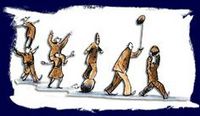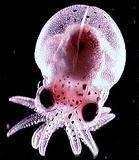I'm culling my bookshelves. Really.
If you would like any of the books listed below,
email me with your selections and an address to which they might be sent.
Disclaimer:
I'm getting rid of these books because I don't much care for them, on some level or other. In fact, there's a few I really hated, so be warned. I've read all of them except the Blais, because I attended a reading of hers shortly after acquiring the book and she put me to sleep, and the Burgess, which I've owned for about 15 years and I just haven't gotten around to it, but maybe I'll check out the story of the meeting between Shakespeare and Cervantes later today. (But I am keeping a few other unread books I've owned for longer. Go figure.) Frankly, I can't imagine any of you really wanting any of these books.
FictionAmis, Martin. Einstein's monsters.
Amis, Martin. Night train. hc
Amis, Martin. Time's arrow.
Barnes, Julian. England, England. hc
Blais, Marie-Claire. These festive nights.
Burgess, Anthony. The devil's mode.
Carey, Edward. Observatory Mansions. hc
Cocteau, Jean. Les enfants terribles.
Deane, Seamus. Reading in the dark.
Grass Gunter. The call of the toad. hc
Hesse, Hermann. Beneath the wheel.
Johnson, Diane. Le mariage. hc
Kazan, Frances. Halide's gift. hc
Leyner, Mark. My cousin, my gastroenterologist.
Mahfouz, Naguib. Miramar.
Malarkey, Tucker. An obvious enchantment. hc
Mantel, Hilary. The giant O'Brien. hc
Morrissey, Donna. Kit's law.
Okri, Ben. The famished road.
Richardson, Bill. Waiting for Gertrude.
Tremain, Rose. The way I found her.
Woolf, Virginia. To the lighthouse.
Yourgrau, Barry. A man jumps out of an airplane wearing dad's head.
NonfictionBergler. The talent for stupidity. (best title ever)
de Botton, Alain. How Proust can change your life.
Dreher, Diane. The tao of inner peace.
Gould, Terry. The lifestyle. hc
Hacking. Mad travelers. hc
McGilvray. Chomsky. hc
Stassinopoulos Huffington, Arianna. Picasso. hc
de Rougemont, Denis. Love in the western world.
Altmann, ed. Cognitive models of speech processing.
Bauer. Introducing linguistic morphology.
Braybrooke. Philosophy of social science.
Coates. Women, men and language.
Cormac. A cognitive theory of metaphor.
Cowan, Rakusan. Source book for linguistics.
Eimas and Galaburda, eds. Neurobiology of cognition.
Harris. How the brain talks to itself.
Jensen. English phonology. (by the most boring prof I ever had)
Ladefoged and Maddieson. The sounds of the world's languages.
O'Grady, Dobrovolsky. Contemporary linguistic analysis.
Ouhalla. Introducing transfomational grammar.
Palmer. Grammar.
Penalosa. Introduction to the sociology of language.
Stillings, Feinstein, Garfield, Rissland, Rosenbaum, Weisler, and Baker-Ward. Cognitive science: an introduction. hc
Wardbaugh. An introduction to sociolinguistics.
That list looks really short, but the pile in the middle of the living room floor looks so big. There's another stack, as big, of books I thought I'd part with, but I'm having second thoughts — I haven't lived with them long enough, or they're inscribed to me personally, or I've forgotten them entirely and their premise suddenly seems fresh and relevant.
Any books you don't want will be dispensed with at... oh, who's kidding whom? I'll just keep them, probably. Except for the Malarkey — it makes me angry to see that one sitting on the shelf.
I'll leave it on a park bench.








